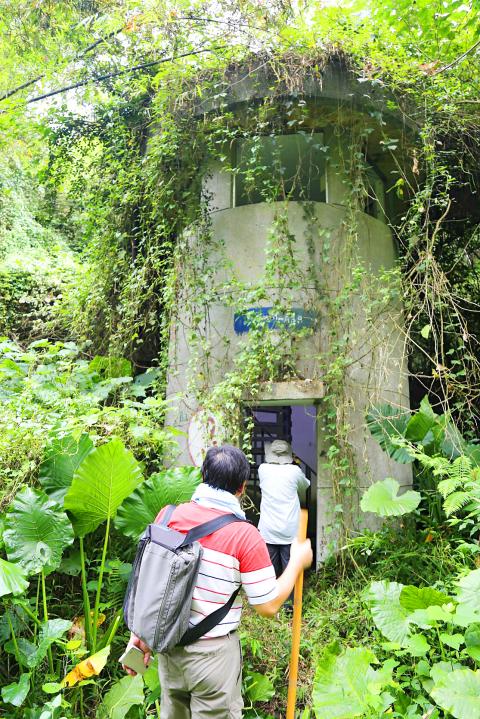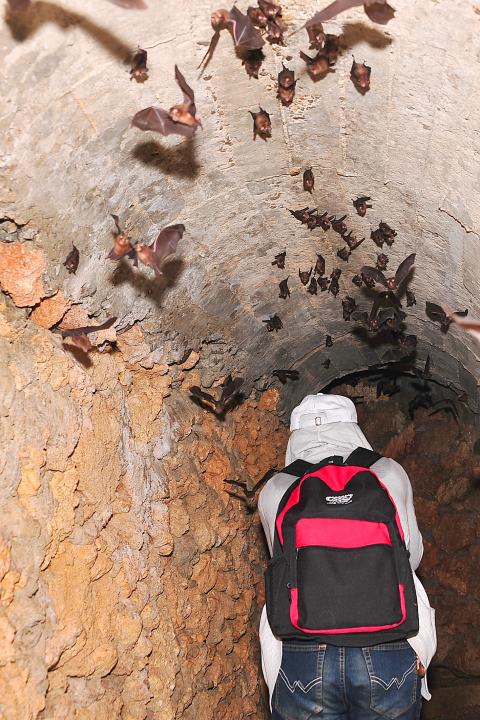The Pingtung County Government last week asked culture and history experts to inspect a former munitions depot in Neipu Township’s (內埔) Laopi Village (老埤), after it was recently discovered.
The munitions storage once served to supply ammunition to the kamikaze pilots of the Special Attack Units of the Imperial Japanese Army, the experts said, adding that it was not only well-preserved, but also of considerable size.
Near the end of World War II in the Pacific theater, the Japanese Empire built up a string of defensive positions stretching from the north to the south of Pingtung to prevent a potential landing by US troops in the south of the island, experts said.

Photo: Chiu Chih-jou, Taipei Times
There were about 20 ammunition depots along the defense line, they said, adding that many of the bunkers had not been found yet.
The experts said they would continue investigating the forgotten bunker cluster of Pingtung with funding provided by the Bureau of Cultural Heritage.
National Pingtung University of Technology and Science secretary-general Yeh Kui-chun (葉桂君) said the university had been given the plot of land by the National Property Administration in 2011 and it had discovered the bunker while inspecting the land with the aim of building an entrepreneurship campus.

Photo: Tsai Tsung-hsien, Taipei Times
The campus will help locals and students study and establish their own businesses, Yeh said, adding that the university had complied with all of the bureau’s demands to make arrangements for the bunker.
The county government said it is also mulling nominating the Guanshan area in Hengchun Township (恆春) as a cultural asset due to a fortified artillery bunker in the area.
Not as well-known as the Guanshan Scenic Area and the local Earth God Temple, the artillery bunker is located underground next to the Guanshan Scenic Trail.
While visiting the site on Thursday, Pingtung County Bureau of Cultural Affairs Director Wu Chin-fa (吳錦發) said he was amazed at the extensive network of underground tunnels, which the county has said is the largest artillery complex on the island from the Japanese colonial era.
The Republic of China Army took over the complex after World War II and it was eventually abandoned after the army relocated its troops, the county government said.
The structural integrity of the tunnel is still intact and the site was largely devoid of trash due to its relatively hidden location, the county said, adding that some bats had moved in.
Experts surmised that the artillery complex had been constructed after the Japanese forces retreated from Batan Island in the Philippines.
The county government has also visited other abandoned military facilities behind Pingan Temple in Fangshan Township (枋山).
A cultural asset meeting is to be held to discuss the preservation of the “precious relics,” it said.
The county government said it would work with local townships to hopefully repurpose the sites and turn them into tourist attractions.

Alain Robert, known as the "French Spider-Man," praised Alex Honnold as exceptionally well-prepared after the US climber completed a free solo ascent of Taipei 101 yesterday. Robert said Honnold's ascent of the 508m-tall skyscraper in just more than one-and-a-half hours without using safety ropes or equipment was a remarkable achievement. "This is my life," he said in an interview conducted in French, adding that he liked the feeling of being "on the edge of danger." The 63-year-old Frenchman climbed Taipei 101 using ropes in December 2004, taking about four hours to reach the top. On a one-to-10 scale of difficulty, Robert said Taipei 101

Nipah virus infection is to be officially listed as a category 5 notifiable infectious disease in Taiwan in March, while clinical treatment guidelines are being formulated, the Centers for Disease Control (CDC) said yesterday. With Nipah infections being reported in other countries and considering its relatively high fatality rate, the centers on Jan. 16 announced that it would be listed as a notifiable infectious disease to bolster the nation’s systematic early warning system and increase public awareness, the CDC said. Bangladesh reported four fatal cases last year in separate districts, with three linked to raw date palm sap consumption, CDC Epidemic Intelligence

Taiwanese and US defense groups are collaborating to introduce deployable, semi-autonomous manufacturing systems for drones and components in a boost to the nation’s supply chain resilience. Taiwan’s G-Tech Optroelectronics Corp subsidiary GTOC and the US’ Aerkomm Inc on Friday announced an agreement with fellow US-based Firestorm Lab to adopt the latter’s xCell, a technology featuring 3D printers fitted in 6.1m container units. The systems enable aerial platforms and parts to be produced in high volumes from dispersed nodes capable of rapid redeployment, to minimize the risk of enemy strikes and to meet field requirements, they said. Firestorm chief technology officer Ian Muceus said

MORE FALL: An investigation into one of Xi’s key cronies, part of a broader ‘anti-corruption’ drive, indicates that he might have a deep distrust in the military, an expert said China’s latest military purge underscores systemic risks in its shift from collective leadership to sole rule under Chinese President Xi Jinping (習近平), and could disrupt its chain of command and military capabilities, a national security official said yesterday. If decisionmaking within the Chinese Communist Party has become “irrational” under one-man rule, the Taiwan Strait and the regional situation must be approached with extreme caution, given unforeseen risks, they added. The anonymous official made the remarks as China’s Central Military Commission Vice Chairman Zhang Youxia (張又俠) and Joint Staff Department Chief of Staff Liu Zhenli (劉振立) were reportedly being investigated for suspected “serious